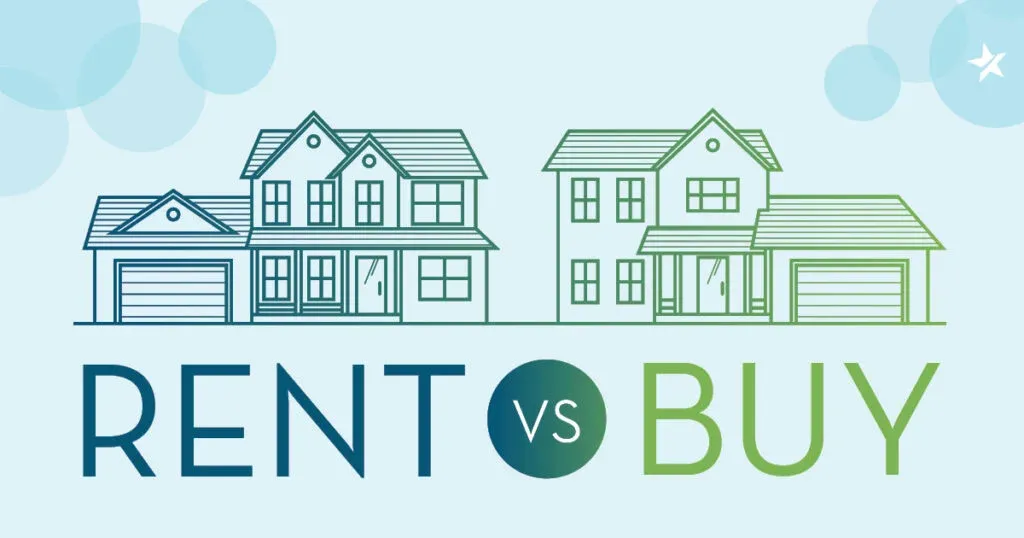

The decision between renting and buying a home is a major financial milestone that impacts your long-term financial health. Let’s explore this topic in more detail with Monkey Mart below. Both options have their pros and cons, and the right choice depends on various factors including your financial situation, lifestyle, and future goals.
When it comes to personal finance, few decisions have as significant an impact as choosing between renting and buying a home. This choice affects not only your monthly expenses but also your long-term financial planning, wealth accumulation, and even your lifestyle. To make an informed decision, it’s crucial to understand the financial implications of both options.
Renting a home offers flexibility and typically requires less upfront investment. You’re not responsible for property taxes, maintenance costs, or repairs. This can be advantageous if you’re not ready to commit to a specific location or if you prefer to invest your money elsewhere. However, rent payments don’t build equity, and you’re subject to potential rent increases and the whims of landlords.
On the other hand, buying a home is a significant investment that can potentially appreciate over time. Mortgage payments contribute to building equity, which can be a valuable asset in your financial portfolio. Homeownership also provides stability and the freedom to customize your living space. However, it comes with additional costs such as property taxes, insurance, maintenance, and repairs. It also ties up a considerable portion of your wealth in a single asset, which can be less liquid than other investments.
The financial comparison between renting and buying isn’t straightforward and depends on various factors including local real estate markets, interest rates, your personal financial situation, and long-term goals. It’s essential to consider both the short-term affordability and the long-term financial impact when making this decision.
Read more: 10 Money Habits That Are Making You Poor (And How to Fix Them)
Renting a home comes with its own set of financial considerations. While it’s often perceived as the more affordable option in the short term, it’s important to analyze all associated costs to get a complete picture.
The most obvious cost of renting is the monthly rent payment. This amount can vary significantly based on factors such as location, size of the property, and local market conditions. In addition to rent, many tenants are required to pay utilities, which may include electricity, gas, water, and internet services. Some landlords include certain utilities in the rent, while others require tenants to set up and pay for these services separately.
Another cost to consider is renter’s insurance. While not always mandatory, it’s highly recommended to protect your personal belongings in case of theft, fire, or other unforeseen events. The cost of renter’s insurance is typically much lower than homeowner’s insurance, often ranging from $15 to $30 per month.
When you first rent a property, you’ll usually need to provide a security deposit, which is often equal to one month’s rent. This deposit is held by the landlord and should be returned to you when you move out, assuming you’ve maintained the property well. Some locations also require the first and last month’s rent upfront, which can make the initial costs of renting quite substantial.
One often overlooked aspect of renting is the potential for rent increases. While some areas have rent control laws that limit how much landlords can raise rent each year, in many places, there’s no cap on rent increases. This means your housing costs could potentially rise significantly over time, affecting your long-term financial planning.
On the positive side, renting typically involves fewer unexpected costs than homeownership. Major repairs and maintenance are usually the landlord’s responsibility, which can provide some financial predictability for renters. However, it’s important to clarify what’s covered in your lease agreement to avoid any surprises.
While renting may seem straightforward, there are some hidden costs to be aware of. For instance, if you have pets, many landlords charge additional pet fees or higher security deposits. Some properties also have amenity fees for access to features like gyms or pools.
Moving costs can also add up, especially if you’re renting short-term and relocating frequently. These might include hiring movers, renting a truck, or purchasing packing materials. Additionally, if you’re renting a furnished apartment, you might pay a premium for the convenience.
Parking can be another hidden cost, particularly in urban areas where dedicated parking spots might come at an additional monthly fee. Similarly, storage costs can accumulate if your rental doesn’t provide adequate space for all your belongings.
Lastly, while not a direct cost, opportunity cost is an important consideration. The money you spend on rent isn’t building equity or appreciating over time. This opportunity cost can be significant over the long term, especially in areas with rising property values.
Buying a home is often seen as a cornerstone of personal finance and wealth building. However, it comes with a complex set of costs that extend far beyond the purchase price of the property. Understanding these costs is crucial for making an informed decision about whether buying is the right choice for your financial situation.
The most significant upfront cost of buying a home is typically the down payment. While it’s possible to find mortgages with low down payment requirements, a larger down payment often results in better loan terms and lower monthly payments. Traditionally, a 20% down payment is recommended to avoid private mortgage insurance (PMI), which protects the lender if you default on your loan.
In addition to the down payment, there are several closing costs associated with buying a home. These can include appraisal fees, title insurance, attorney fees, and various other charges that typically amount to 2-5% of the home’s purchase price. Some buyers negotiate for the seller to cover a portion of these costs, but it’s important to be prepared for these expenses.
Once you own the home, you’ll be responsible for property taxes, which can vary significantly depending on your location. Homeowner’s insurance is another ongoing expense, which is typically more expensive than renter’s insurance due to the coverage of the structure itself.
Maintenance and repairs are often underestimated costs of homeownership. As a general rule, you should budget about 1% of your home’s value annually for maintenance. This can cover routine upkeep as well as saving for larger expenses like replacing a roof or HVAC system.
If you’re buying a condominium or a home in a planned community, you may also have to pay homeowners association (HOA) fees. These fees cover shared amenities and services but can add significantly to your monthly housing costs.
While the costs of buying a home are substantial, it’s important to consider the long-term financial implications as well. One of the primary advantages of homeownership is building equity. As you pay down your mortgage, you’re increasing your ownership stake in a valuable asset. Additionally, if property values in your area increase over time, you could see significant appreciation in your home’s value.
Homeownership also provides certain tax advantages. Mortgage interest and property taxes are often tax-deductible, which can lead to savings on your annual tax bill. However, it’s important to consult with a tax professional to understand how these deductions apply to your specific situation.
Another long-term consideration is the stability of your housing costs. While a fixed-rate mortgage provides predictable monthly payments, other costs like property taxes and insurance can increase over time. However, unlike rent, which can rise unpredictably, these increases are often more gradual and manageable.
Lastly, owning a home can be a form of forced savings. Your mortgage payment is partially going towards building equity, which can be accessed later through home equity loans or by selling the property. This can be a valuable financial resource for future needs or opportunities.
Read more: How to Build Credit as a Beginner: Step-by-Step Guide
The decision to rent or buy a home isn’t solely based on financial calculations. There are several other important factors to consider that can significantly impact your choice.
One crucial factor is your timeline. If you’re planning to stay in an area for less than five years, renting might be more advantageous. The costs associated with buying and selling a home can be substantial, and you may not have enough time to build equity or see appreciation that offsets these costs. On the other hand, if you’re looking to settle down in a location for the long term, buying could provide more stability and potential financial benefits.
Your career and lifestyle are also important considerations. If your job requires frequent relocation, or if you value the flexibility to move easily, renting might be more suitable. Homeownership ties you to a specific location, which can limit your ability to pursue career opportunities or lifestyle changes in different areas.
The local real estate market plays a significant role in the rent vs buy decision. In some areas, home prices may be so high relative to rents that buying doesn’t make financial sense. In other markets, low home prices and high rents might make buying more attractive. It’s important to research and understand the dynamics of your local market.